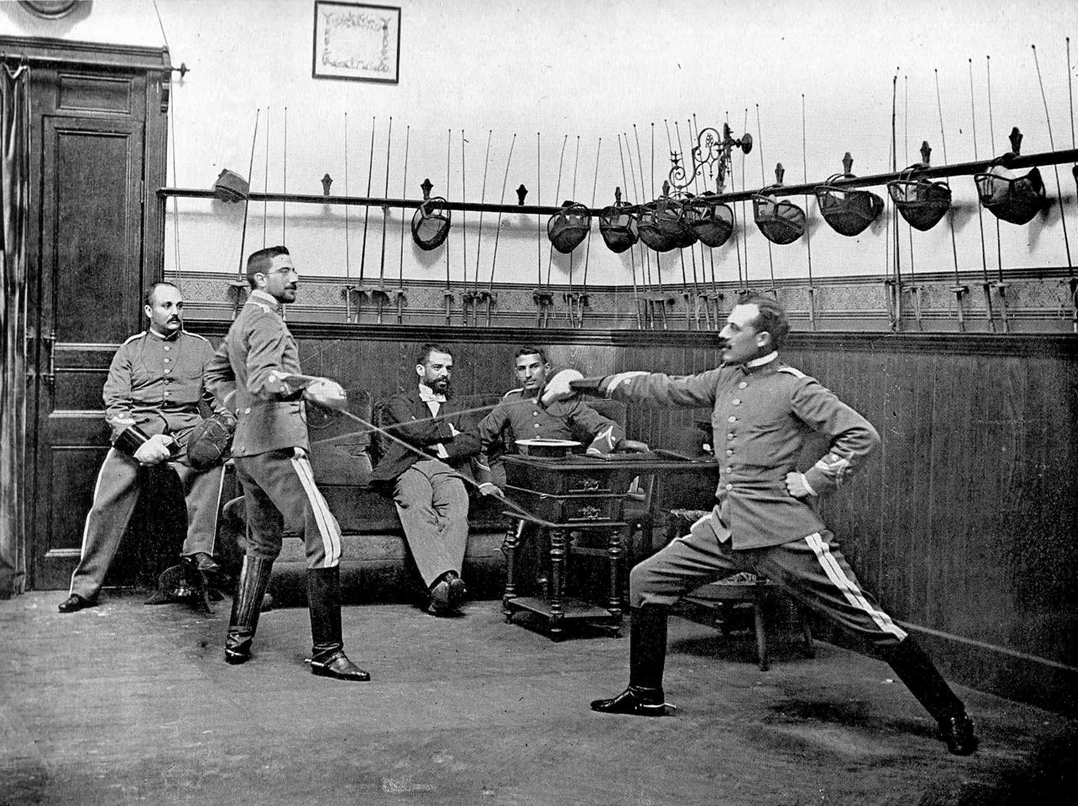Editor’s note: The following is extracted from On Anything, by Hilaire Belloc (published 1910).
When I was in the French Army I met many men who had a constant tradition of the military past. These were not in the regiment, but one came across them in the garrison town where we were quartered, and among others there was an old man whose father had fought in the Peninsula and who retained a very vivid family memory of those wars. From this old man I gathered in particular what I had learned in general from reading, an impression of the Spaniard as a soldier, but that impression was false. It was false for many reasons, but chiefly for this: that Spain, like the United Kingdom, is very highly differentiated indeed, and province differs from province to an extent hardly ever grasped by those who have never visited the country.
When, many years later, I had the opportunity to visit Spain, this was the first point I noticed. It is particularly striking in the mountains. You will find yourself with one type of man talking Catalan in some small modern village; the way in which he tills his garden, the way in which his house is built, and the way in which he bargains with you, are all[Pg 230] native to his race. You set off over the hills and by evening you come to another village more different than is a Welsh village from an English one, for you have crossed from Catalonia into Aragon. Then, again, the boundary of the Basque Provinces, or at least of the Basque race, is as clean as a cut with a knife. One may argue indefinitely whether this is because the Basques have preferred the peculiar climate and soil of their inhabitance or whether it is their energy and tenacity which have changed the earth, but there it is. The Basque is much more separate from the people around him than is even (if he will pardon my saying so) the Irishman of the West from the Scotchman of the Lothians.
There is another form of differentiation in Spain which is so striking that I hesitate for adjectives to describe it lest those adjectives should seem excessive; but I will say this, it is more striking than the contrast between the oasis and the desert in Africa, and that is pretty strong. I mean the differentiation produced by the sudden change from the high plateaux to the sea-plains. The word “sea-plains” is not strictly accurate, the belt running back from the Mediterranean sometimes looks like a plain, sometimes like an enclosed valley, more often it is a system of terraces, hills upon hills, but at any rate when you are once out of the influence of the sea and on to the high plateaux which form, as it were, the body of the Spanish square, you pass from luxuriance to sterility, from ease to hardship, and from the man who is always willing to smile to the stoic.
Then, again, you have the contrast between Andalusia and everything to the north of Andalusia. Andalusia was the very wealthy part of Spain under the Romans. It must always remain the very wealthy part of Spain so far as agriculture is concerned. It has easy communications and a climate like nothing on earth. Therefore, when the Moors came there they found a large, active, and instructed Christian population, and they ruined Andalusia less than any other part of Spain. Nay, in some odd (and not very pleasant) way they married the Asiatic to the European, and the European solidity, the European power over stone, the European sense of a straight line, were in Andalusia used by the vague imagination of the Asiatic to his own purpose, with marvellous results. All this has produced a quite distinct type of man; and it is remarkable that, as is to be found in so many similar cases in Europe, the people exactly limitrophous to Andalusia on the north are peculiarly sparse, impoverished and alone. There lies the wide and arid sweep of La Mancha, imperishable in European letters.
Now, having said so much as to this high differentiation of the Spanish people (and one could add much more: the Asturias, always unconquered; the Atlantic tides and rivers, the tideless Eastern harbours, the curious poverty of Estremadura; the French experiments of Madrid and its neighbourhood, so utterly ill-fitted to the climate and the genius of Spain), let me say something of the Spanish unity.
No nation in Europe is so united. By which I do not mean that no other nation is so homogeneous, even in those deep things which escape superficial differentiation. The Spaniard is united to the Spaniard by the three most powerful bonds that can bind man to man — religion, historical memory, isolation. It is not to be admitted by any careful traveller that the religious emotion of the modern Spaniard is either combative or profound. Indeed, I know of nothing more remarkable than the passage from Spanish to French thought in this respect. You leave, let us say, Huesca; you notice at the morning Mass a moving and somewhat small concourse of worshippers, few communicants, but above all in the temper of the place, in the written stuff of the somewhat belated newspapers, a sort of indifference; as though the things of the soul “muddled through.” You bicycle a long day to Canfranc, the next day you are over the hills (and Lord! what hills), and there you are in the seething vat of the great French quarrel. From the little villages right up to the majestic capital, Toulouse, you feel the pulsation increasing. Religion and its enemies are there at war. The thing is vital, and men are quite ready to die on either side. Of this, I say, you find little or nothing in Spain; nevertheless, religion does bind the Spaniard to the Spaniard, and it binds him firmly to his kind. For the very fact that there is so little opposition, while it produces so much indifference, produces also a singular national contempt; and every man speaking to every other man knows with precision how that man’s mind stands upon the ultimate things, how careless he is and yet how secure.
Again, the Spaniards are united by that profound historical memory which is a necessity to all nations and a peculiar asset in those who retain it alive. We in this country feel the appetite for an historical memory; we attempt to satisfy that appetite by the creation of legends; we call ourselves “Anglo-Saxons” — there is even, I believe, a notable body which will have us descended from the ten Lost Tribes. The French satisfy that appetite by recurrent experiences: the reign of the Grand Monarque, the Revolution, 1870. Glorious or tragic, each national experience gives a new impetus to the historic memory of the French people. Not so the Spaniard. All Spain is bound together by the enormous recollection of the Reconquista. Here is a province in which the Faith and the Roman Order were not recovered by persuasion (as was the case with Britain) nor were utterly lost (as was the case with Africa for so long) but were got back mile by mile as the prize of hard fighting. That fighting was, so to speak, the very trade of the Spaniards, from the time when Charlemagne was a little boy to the time when Henry VIII was a little boy. All the story of our European growth, the time when we were made, the time which is to the French the accomplishment of their unity, to the English the foundation of their institutions, to the Italians the development of their art, that to the Spaniard is the story of the Reconquista. And the Middle Ages, which have impressed themselves upon every European nation as the glorious transition of youth impresses itself upon the sad memory of a man, stand to the Spaniard for the Reconquista. This has nothing to do with his knowledge of names or with what is called “Education.” It is in the blood. The best proof of its result is this, that the Englishman invariably says of the Spaniard that, while other nations show differences of manner changing from class to class, the Spaniard is always a “gentleman.” The word “gentleman” is a very meagre word, but on the whole the man who uses it best means the tradition of the Middle Ages, and especially of the fighting men which the Middle Ages produced, and the Spaniard everywhere shows the external qualities of those men. For instance, you cannot insult him with impunity, and that characteristic, though we often write it down, is one which in other nations is somewhat rare. Take the modern for all in all, and outside Spain, if you insult him he will usually argue.
Finally, the Spaniards are bound together by their isolation. From the Straits of Gibraltar to the Pyrenees, different as province is from province, you feel everywhere something quite separate from that which lies north of the Pyrenees, and from the Pyrenees on, all over the west of Europe. Roads are an exception, paths the rule; the hours of meals, the very habit in the wearing of the clothes, the form of salutation, the mule taking the place of the horse, the perceptible restraint in every kind of converse, all these mark out the harsh soil which lends a perpetual note of nobility to the story of Europe. No man who has known Spain but would be able to say, if he were taken there blindfold, and suddenly shown his surroundings, “This is Spain.” The frontier is sharp, the division clear, the isolation absolute.
The limits of these few pages forbid me a thousand things in this respect. I wish I could describe (for instance) how there is in every Spanish building, from the least to the greatest, something at once severe and strange. Bowling into that great harbour of Barcelona one sees the Customs House, a building with wings. Coming over the northern slopes of the Guadarrama one sees Segovia sailing out in some immortal way as though the cathedral and palace intended to attempt the air. Spain lives, and will revive by such imaginations.
It should be added, by way of closing these few notes, that the Spanish man is not only silent (which is perhaps a fault in him) but square, and so healthy in his limbs and in his mind that when he is rested and can speak again something will be changed in Europe.









